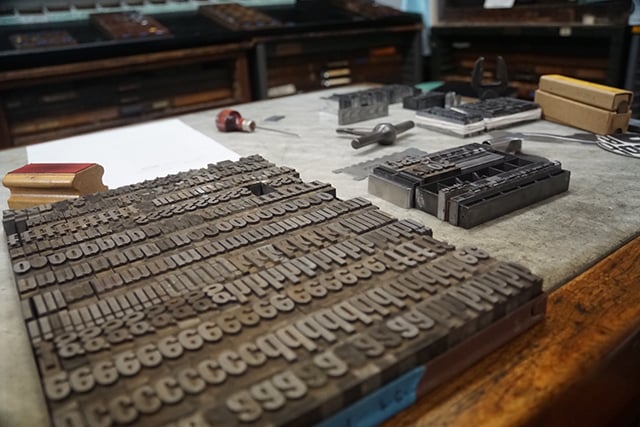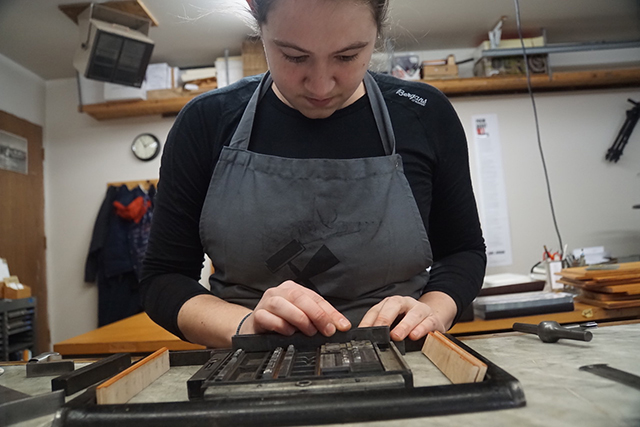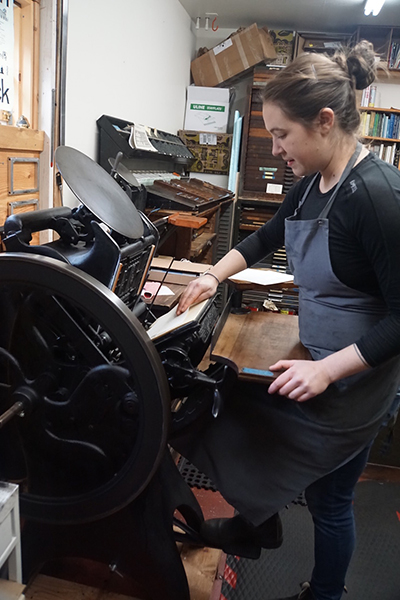
The words of one preeminent type scholar Beatrice Warde, hang on the front door of Myrna Keliher’s printing press:
This is a printing office
Crossroads of civilization
Refuge of all the arts
Against the ravages of time
Armoury of fearless truth
Against whispering rumour
Incessant trumpet of trade
From this place words may fly abroad
Not to perish on waves of sound
Not to vary with the writer’s hand
But fixed in time having been verified in proof
Friend you stand on sacred ground
This is a printing office
A printer, publisher and artist, Keliher’s Expedition Press is set up in a converted garage near the ferry dock in Kingston, Washington, in Washington State’s Puget Sound.
In her own words, Keliher describes her work as “Amplifying damn fine words with exacting typography” by using “handset type, antique presses, and a Macbook to make prints and poetry books. From abstract art to literary broadsides to personal propaganda, we work to deepen regard for language and to increase access to poetry.”
Talking with Keliher, one quickly sees how all the events in her life conspired exactly to place her in this converted garage with three old presses where her heart guides her work. And it pays her bills.
“I couldn’t float this in Seattle,” she tells Truthout. “But I wouldn’t want to, either.”
Having grown up in Indianola, a small seafront town a stone’s throw away from her studio, Keliher is literally unable to leave her studio without crossing paths with a close friend or relative. Her experience of community is this: “If something is asked of you and you are able to provide it, give it, or help, of course you do what is needed. And if you need something, you ask, and it shows up. And that is my life experience.”
Sabina, a sophomore at the local high school, is doing an apprenticeship with Keliher.
Sabina printed June Jordan’s “Poem about My Rights” in the studio using one of her printers, along with Keliher’s tutelage. After addressing the CIA, rape, women’s rights, Exxon, racism, and other issues, the ending of the poem reads:
… I am not wrong: Wrong is not my name
My name is my own my own my own
and I can’t tell you who the hell set things up like this
but I can tell you that from now on my resistance
my simple and daily and nightly self-determination
may very well cost you your life

With Keliher’s help, Sabina walked through the process of obtaining the rights to sell prints of the poem nationally, and has decided to donate all the proceeds of the sales to Black Lives Matter and Planned Parenthood.
That is the kind of thing that happens in Keliher’s studio. And that kind of energy is why she is overwhelmingly busy.
“I don’t have time do to that with Sabina,” she says with a smile while pointing at the poem as it hangs on a nearby wall. “But I can’t afford not to do it.”
The Art of Saying What Can’t Be Said
We talk standing between her work tables. Underneath are seemingly countless drawers full of various sized lead letters she uses for her work. Each letter, and each spacer, a tool of precision for Keliher.
There are three platen presses she uses. The largest is a 1906 Colt’s Armory Press that weighs 3,400 pounds. Made of cast iron, it was moved into her studio by a forklift and industrial machine skates, albeit carefully, as it is one of the rare few of its kind that remain functional on the planet, according to Keliher.
The mid-sized press nearby is a 1901 Golding Jobber, and the smallest is a Craftsman Imperial circa 1930s, making it the “newest.”
“I love these presses because they were built by people who were making things to last,” she says, looking at the presses as one looks at a beloved. “What a simple idea! They were so well made, they just work.”
Keliher refers to herself as “a caretaker of these presses” and sees herself as part of a lineage of such. She knows two of the previous owners of her Colt, one of them being Harold Berliner of California, who authored the Miranda rights — a person’s right to silence given by police when they are taken into police custody. She explains how he printed them up on vinyl weatherproof cards for the police officers of California on, quite possibly, the press that she uses in her studio today. “He then sent them out to other states, and they started using it, because he’d printed them, and that is essentially how the Miranda rights came to be used nationally,” she explains, keeping the history of this machine alive by her memories and its use.
Keliher holds literature, poetry and philosophy in the same reverence.
Long before she realized she would become a printer, she abandoned all her science classes and a scholarship at the East Coast school she was attending, and came back to Washington and began painting houses before resuming her studies in the arts at Evergreen State College.
A woodshop class in traditional Japanese architecture found her working with her hands; she described the experience as feeling “connected to myself in a way I had never allowed before.”
Shortly thereafter, a literature course, then some literature and philosophy and basic printing and book binding, and she was on a trajectory towards what has been her passion ever since.
Yet it was the writing she was reading that stirred her depths, informed her life and provided her with seemingly personal relationships with the authors via their work.
Stéphane Mallarmé, Friedrich Nietzsche and others were whose words she learned while taking courses in typesetting and book binding 101. “I physically remember setting my first line of type,” she says. “So I imagine that was what it was like for a painter to discover their paints. Letterpress became a beautiful entry point for me into art via a technical machinery avenue. And that led to a life informed by language, reading and writing.”
Ever since, Keliher has been completely captivated by language, as well as what we can and cannot communicate.
“There’s a line between what can be said and what can’t be said,” she says as her eyes widen in wonder. “Poetry can be said to be the art of saying what can’t be said. For me, with the visual work I do, typography and the visual arrangement of letterform and words on a page, I’m working on that edge of what can be said and not be said, the edge of what can be seen and not be seen.”

Literally making words appear on paper, thus making language visible, excites her, right along with giving others a different experience of words and language so easily taken for granted. “I just want to see more all the time,” she says while hold her arms out. “What more can I see? When I come across a line from a poem that hits me deeply, I have a visceral experience. It hits me … it impacts me. Sometimes I’ll read a line and just stop and cry. Or a line gets stuck inside me, for years at a time.”
Keliher says one particular line of Audre Lorde’s poem “Power” impacted her: “I have not been able to touch the destruction within me.”
“When I encountered that a few weeks ago, in the middle of a poem, when I read it, it just really hurt. I read it and felt like I’m being seen,” she says. “Something deep and painful is being seen by someone who wrote it 30 years ago.”
Commitment
Her love of the outdoors is tangible, and it is another thing she works to share with others. Keliher co-founded Wild Society, a small nonprofit geared towards, as she puts it, “cultivating wonder and belonging in the natural world.”
“You conserve things you care about, about what you love,” she explains. “To love something, you have to understand and know it; you need a relationship. We work to reconnect human hearts with the everyday wild. So we do this with kids.”
Each summer, she and her colleagues at Wild Society work to bring local youths into the wilderness of Olympic National Park for three separate weeklong backpacking trips. Fundraising now allows them to offer financial aid and loan the necessary equipment.
Additionally, Keliher regularly runs what she calls “personal propaganda workshops” at her printing studio, the goal of which is to take somebody’s message, craft it, and commit it to paper, then printing a stack of postcards they can take away with them. People quickly learn that it takes work to put their words together, literally, which brings an entirely different level of commitment.
“This takes more than a Facebook post,” she explains, narrowing her eyes. “What do I really want to say? There is a distillation process that this encourages, and commitment to your words when you print them this way. It is also empowering in that way.”
Time
Fascinated by how someone doing the kind of work she does experiences time, I ask her about her relationship to it.
Keliher pauses for a long time and thinks.
“There definitely are regular occurrences in my life where I experience time expanding,” she says with a soft smile. “A lot of that is in my design process. I’m perfectionistic in a way; I’m highly methodical. But, here [she stands and turns to her work table], I can go into this space, and this work becomes everything.”
For it is there that she spends hours adjusting white space by points, by

merely the thickness of a post-it note, or the thickness of a piece of cigarette paper. That is where time expands, and she allows it to.
“It is an allowing,” she says. “Time expands the most when I’m in the backcountry. And it’s exponential, as each additional day out there further deepens your experience with the planet.”
Bringing the conversation back to her studio, she discusses how she often works at night, because of a feeling of expansiveness with no deadlines, and no one to respond to. Smiling, she says, “Here is a piece of my personal propaganda,” and hands me a small card, upon which in fine letters is printed: “Allow the Time That It Takes”.
“You can talk about coming back to a tangible thing or slowing down,” Keliher says. “But the thing about the decision to print something letterpress — you are automatically assigning a temporal value to that thing. When I call a poet and ask them if I can print a broadside of a poem or line, most of them are thrilled. I feel like I’m making things for the future. I’m thinking over a longer arc of time. I would argue a good poem transcends time. … If a poem is a useful thing and transcends time, isn’t it worth making it an object that is going to withstand some time?”
Press freedom is under attack
As Trump cracks down on political speech, independent media is increasingly necessary.
Truthout produces reporting you won’t see in the mainstream: journalism from the frontlines of global conflict, interviews with grassroots movement leaders, high-quality legal analysis and more.
Our work is possible thanks to reader support. Help Truthout catalyze change and social justice — make a tax-deductible monthly or one-time donation today.